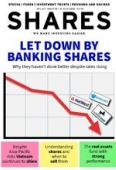Archived article
Please note that tax, investment, pension and ISA rules can change and the information and any views contained in this article may now be inaccurate.
The risks of getting sucked into high yielding motor insurers

Shares in motor insurance group Sabre (SBRE) and Direct Line (DLG) both slumped heavily on profit warnings on 14 July and 18 July respectively.
This has led to selling across the wider peer group and has pushed dividend yields to double-digit levels in some cases. However, there are big risks to consider for investors attracted to this generous-looking income.
Sabre is now guiding for earnings per share declines of 70% in 2022, and 30% in 2023.
According to consensus estimates, at the current share price fellow motor insurer Admiral (ADM) offers a 9% dividend yield for 2022, falling to 6.9% for 2023.
Direct Line offers a 10.8% dividend yield and an eye-watering 11.3% dividend yield next year.
However, Direct Line has indicated it will cancel a planned share buyback and keep the dividend flat for now. Investment bank Jefferies has reduced its own dividend estimates by 36%.
This demonstrates the risks of investing in a stock with a very high yield, particularly without serious investigation. Often it is a sign that payouts are unsustainable.
Thanks to a combination of escalating claims inflation and declining volumes motor insurers are experiencing a big drop in their combined ratio. This is calculated as expense claims and costs divided by the premium.
This should not come as a huge surprise when you consider that during the pandemic people still paid to keep their cars insured but were less likely to be on the road and therefore claims fell substantially. That situation has now unwound and it will likely take some time for premiums to catch up with claims inflation.
SABRE SLICES DIVIDEND
As a result of the tough backdrop Sabre’s management has already said it will cut its dividend for this year.
Sabre is considered to be one of the better performers in the market and it is reasonable to assume that if is encountering difficulties then other insurers are also feeling the pain.
In theory Direct Line is more diversified than its peers, given that the group has a sizeable home and commercial line business.
By owning its repair garage network DLG Auto Services, Direct Line has been able to keep underlying claims inflation at lower levels than its competition, giving it a competitive advantage.
Currently 55% of work goes through DLG Auto Services but the longer term aim is for 70% of repairs to go through the centres.
Berenberg recently noted that, in the context of the recent weakness in the Admiral share price, the group has a proven track record of outperformance in a competitive environment.
However, the severity of Sabre’s warning will have given investors pause for thought. Direct Line posts first half results on 2 August with Admiral following suit on 10 August.
Important information:
These articles are provided by Shares magazine which is published by AJ Bell Media, a part of AJ Bell. Shares is not written by AJ Bell.
Shares is provided for your general information and use and is not a personal recommendation to invest. It is not intended to be relied upon by you in making or not making any investment decisions. The investments referred to in these articles will not be suitable for all investors. If in doubt please seek appropriate independent financial advice.
Investors acting on the information in these articles do so at their own risk and AJ Bell Media and its staff do not accept liability for losses suffered by investors as a result of their investment decisions.
Issue contents
Education
Feature
Great Ideas
News
- Profit warnings galore as companies struggle with higher costs and lower demand
- Find out why consumer health group Haleon’s debut fell flat
- Investors are rushing to exit funds as small cap specialists really suffer
- Wealth preserver Ruffer warns bear market is ‘only mid grizzle’
- Fevertree’s earnings forecasts slashed by nearly 50% after problems get worse
 magazine
magazine








